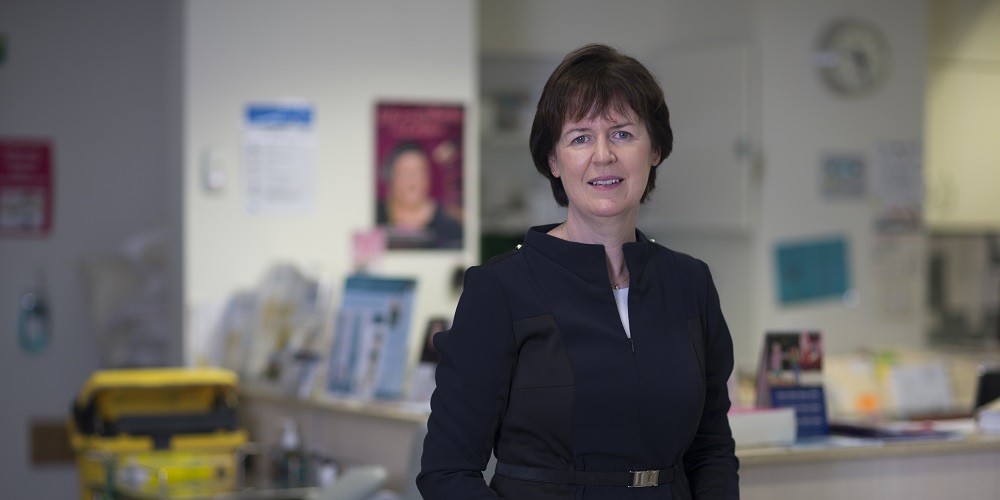
Women diagnosed with ovarian cancer and their families are now being fast-tracked through genetic testing thanks to a change in the model of care, led by the Royal Women’s Gynaecology Oncology unit and Royal Melbourne Familial Cancer Centre.
It has also contributed to a rise in women being tested for genetic variations that can drive cancer and a rise in women choosing to undertake risk reduction surgery to have their ovaries removed without having experienced cancer.
February is Ovarian Cancer Awareness Month. Unlike many other cancers, ovarian cancer has had little improvement in survival rates as there is no proven early diagnostic screening test available, resulting in women usually being diagnosed once the disease is in the late stages. Around 43 per cent of women are alive five years after diagnosis.
After the impact of the ‘Angelina Jolie effect’ in 2013 – when actress Angelina Jolie announced she had undergone a preventative double mastectomy due to her carrying the BRCA1 gene variation, and subsequently had her ovaries and fallopian tubes removed two years later – much attention has been given to the importance of genetic family history in predicting a woman’s ovarian cancer risk. Indeed Angelina’s genetic variation came to light because her mother had had ovarian cancer.
The gene variations BRCA1, BRCA2 and Lynch Syndrome, increase the risk of a woman developing ovarian cancer by up to 60% (for BRCA1).
Previously women recommended for genetic testing had to arrange separate appointments with a genetic counsellor but now, experts from the Women’s Gynaecology Oncology and RMH Familial Cancer Centre have introduced a genetic counsellor into the gynaecology oncology team, to meet with patients shortly after their ovarian cancer diagnosis and streamlined their genetic appointments with their cancer treatment, cutting down overall appointment time.
The Women’s honorary genetic counsellor Maira Kentwell, who also works at the Royal Melbourne Hospital and Peter McCallum Cancer Centre, took on the role.
“We know with ovarian cancer patients, it’s a tough journey,” Ms Kentwell said.
“This model of care means we can fast-track women’s genetics appointments with the journey they are already on. This allows for a much earlier identification of a gene mutation and the ability to inform the woman’s extended family so they too can consider getting tested.
“For those that have the gene variation they can receive counselling around risk reduction surgery to reduce the risk of both breast and ovarian cancers. For relatives that don’t have the gene, it can provide much relief and reduces the fear that they or their children will have a high risk of cancer.”
The Women’s Director of the Gynaecology Oncology Unit, Associate Professor Orla McNally, said the new model of care had received international recognition, and a review of the service was due for publication shortly in the prestigious International Journal of Gynecologic Oncology.
“There has been an explosion in the scientific and medical world regarding the genetic basis for cancers and the biggest knock-on effect in gynaecological cancer has been the BRCA and Lynch Syndrome gene variations,” A/Prof McNally said.
“The majority of women diagnosed with ovarian cancer are at a late stage which is why genetic testing is so important for alerting those who have an inherent higher risk. If a woman has ovarian cancer and is found to have a BRCA gene variation, there’s a 50 per cent chance a sibling, daughter or son will also have it.”
A/Prof McNally said the benefits of this new model of care were immense.
“Knowledge is power,” she said. “This streamlined, world-class model of care we provide is giving women diagnosed with ovarian cancer and their families potentially life-saving genetic information so they can be empowered to make informed decisions about their own health and bodies.”
Ms Kentwell added that many ovarian cancer patients had voiced a feeling of relief when a variation was found.
“Women have said their results have given them an explanation for why their cancer happened and it wasn’t necessarily their ‘fault’ they got cancer,” she said.
“It also provides them with hope that other women in the family won’t have to go through what they went through.”
This service is now embedded in the VCCC gynaecological cancer tumour stream.
Read related content from the Women's
-
 Fertility specialists achieve new birth success from ovarian tissue graft
Fertility specialists achieve new birth success from ovarian tissue graftNew parents Jodie and Aden: Evie has made our lives complete
Learn more -
Ovarian cancer
The ovaries are small organs that make female hormones and eggs. Around 3 in 100 Australian women who have cancer have ovarian cancer. Each year, about 1300 Australian women find out they have ovarian cancer.
Learn more -
 Ovarian cancer breakthrough
Ovarian cancer breakthroughClinicians and patients from the Women’s involved in ovarian cancer study that reveals how deadly ovarian cancer outsmarts chemotherapy
Learn more -
 Ovarian cancer research: making a difference
Ovarian cancer research: making a differenceOvarian cancer research: the Women's making a difference
Learn more